by Nancy Jaffer | Aug 29, 2024
Multifamily housing, a 200-room hotel, retail offerings, entertainment elements and youth sports facilities are slated for the 80 acres around Monmouth Park, where racing is slated to continue at the New Jersey track under an 85-year lease agreement.
It was announced today by the track that the New Jersey Thoroughbred Horsemen’s Association, along with the New Jersey Sports & Exposition Authority, has transferred the racetrack to Dennis Drazin’s Darby Development LLC. That entity had been operating the racetrack and now will have full control over the property. Groundbreaking for the new project is set for late 2025.
“Let me start by thanking Gov. (Phil) Murphy for entrusting me, and my entire team, with one of New Jersey’s most iconic landmarks and one of the nation’s top racing venues,” said Drazin, chairman and CEO of Darby.
“While we have been operating the racetrack for just over the past decade, we can now implement our vision for the future, which includes, in conjunction with (developer) Morris Bailey, a world-class housing project with full amenities, sports complex, first-class hotel and much, much more. All of this will complement and support our main business, horse racing.”
Bailey, a horse racing enthusiast whose JEMB Realty owns and operates North American commercial and residential properties, as well as the Resorts Casino in Atlantic City, will lead the development projects at Monmouth Park. Groundbreaking is set for late 2025.
“We are committed to providing fans with top-quality racing at a venue second-to-none,” Drazin said.
“Today’s actions will ensure a robust future for Thoroughbred racing in the Garden State and it’s with great pride and humility that we embark on a new future for Monmouth.”
Monmouth has 51 days of live racing at the track near the Shore in Oceanport, mostly on weekends, May through September. It also has 10 days at the Meadowlands in northern New Jersey during September and October.
“Monmouth Park Racetrack is an iconic New Jersey attraction,” said Gov. Murphy. “We are thrilled to see this project move forward, which will bolster the local economy and ensure that the area is a popular destination for generations to come.
“Through this important development, the history and legacy of this racetrack will not only be solidified but expanded and enhanced so that more New Jerseyans can experience its excitement.”
“The NJTHA have been great tenants and partners for the last 12 years,” said Paul Juliano, president and CEO of the NJSEA.
“I, along with everyone at the NJSEA, join the governor in taking great pride in securing sustainability and the long-term success of Monmouth Park Racetrack with the new lease for generations to come.”
Said Bailey, “We are embarking on the next phase of a journey that began over a decade ago when we developed plans to reimagine and reinvent the Monmouth Park experience that has brought so much joy to generations of horse racing enthusiasts.
“We have always been staunch advocates for returning the area to its rightful place as the premier destination for horse racing and family entertainment, while including important components that serve the community at large. After an intensive, complex and lengthy process, our plans will create a vibrant lifestyle destination for future generations and will put the racetrack on a trajectory for enormous growth,” he pledged.
Monmouth has roots dating back to 1870, but a state ban on parimutuel betting eventually closed it down. The track reopened in 1946 under Amory Haskell, who had led the legislative effort to permit wagering on horse racing again. The track’s featured race, the $1 million Haskell Invitational in July, is named after him.
In 1986, the state acquired the racetrack and operated it under the NJSEA until 2012, when the NJTHA took the reins as lessee.
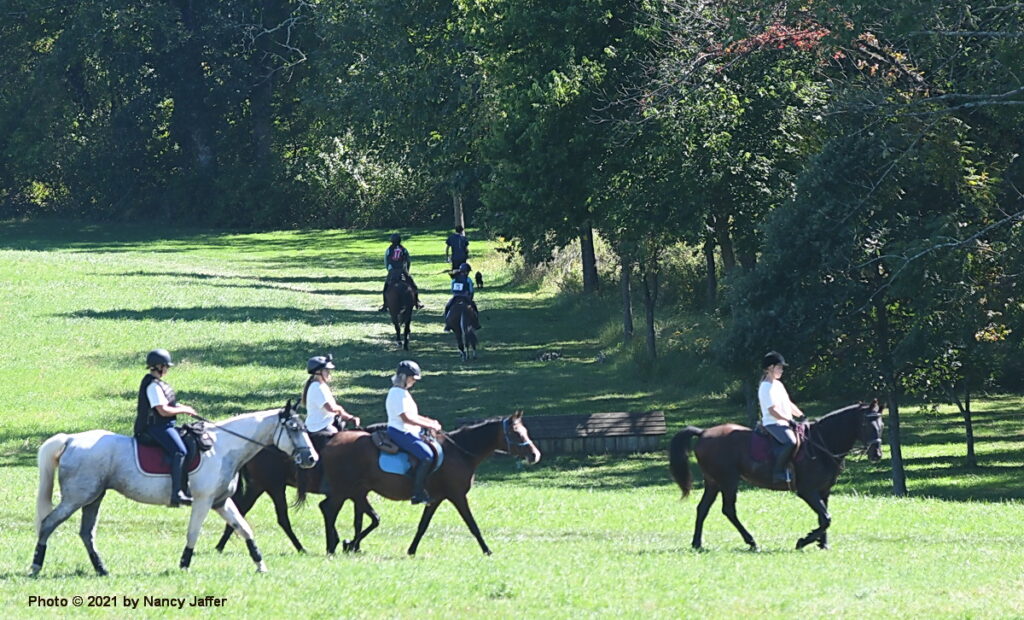
by Nancy Jaffer | Sep 5, 2024
The Tewksbury Trail Association has one of the best trail paces in New Jersey. It caters to riders of all levels and ages at Christy Hoffman Farm Park on Fairmount Road West in Califon Sept. 15 from 8 a.m.-12:30 p.m.
Participants will go across open fields and forest trails, experience water crossings and have the option of taking jumps if they wish. There are four divisions: Open and 90-plus (adding up the age of the participants) and Trail Pace and Pleasure Pace.

“We have developed a seven-mile-plus course with a trail and pleasure pace option that will accommodate riders of all levels”, Jeannie Shuster, president of the TTA, explained.
“This year, we have opened a few new sections of our TTA trail network, allowing us to introduce our riders to an even wider variety of our beautiful trails.”
Gia-Raquel Esposito, TTA vice president, noted, “In addition to ribbons, we will again have a great selection of prizes for all divisions. All TTA-members will enjoy a discount on the registration fee. And we will have a special TTA Trail Pace 2024 T-shirt for the participants” on a first-come, first-serve basis.
An equine veterinarian will be on hand during the event.
For more information, go to the new TTA website: www.tta-nj.org
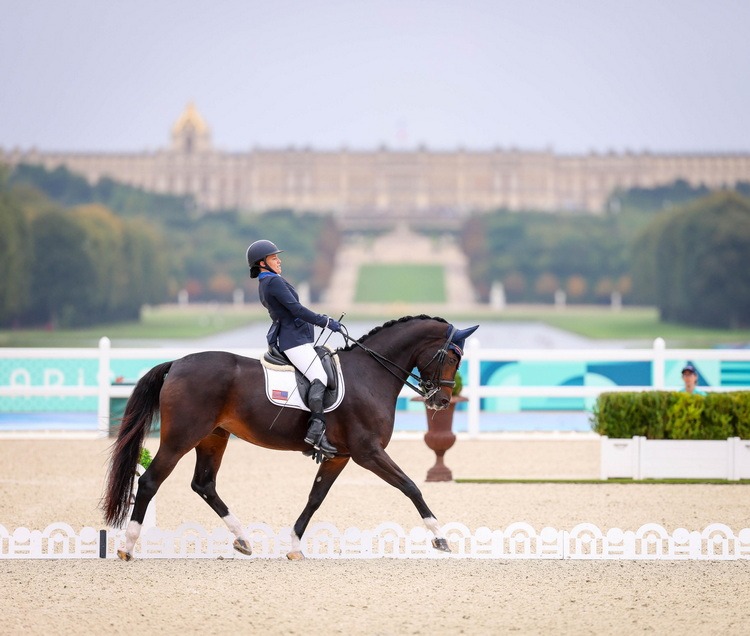
by Nancy Jaffer | Sep 3, 2024
It was time for U.S. riders to deliver their best in the Paralympics, and that’s what they did Tuesday, as equestrian competition got under way in Paris with 78 riders, the largest entry ever for such an event.
Rebecca Hart and Floratina secured individual gold in their first test, earning a personal best score of 77.9 percent in FEI Grand Prix Test A in Grade I for their first individual podium finish together. It is Becca’s fifth Paralympic Games representing the United States, but the gold marks the first individual Paralympic medal of her career.

Becca Hart and Floratina against the backdrop of the Chateau de Versailles. (US Equestrian Photo)
“It’s been 25 years of trying to get to this point and being close many, many times,” she said.
“To actually get it, I feel like I’m going to wake up at any moment. It’s just surreal. It feels like a dream.”
Meanwhile, Becca’s teammate, Fiona Howard, made her Paralympic debut a winning one that also was a personal best triumph, 76.93 on Diamond Dunes in the Grade II competition.
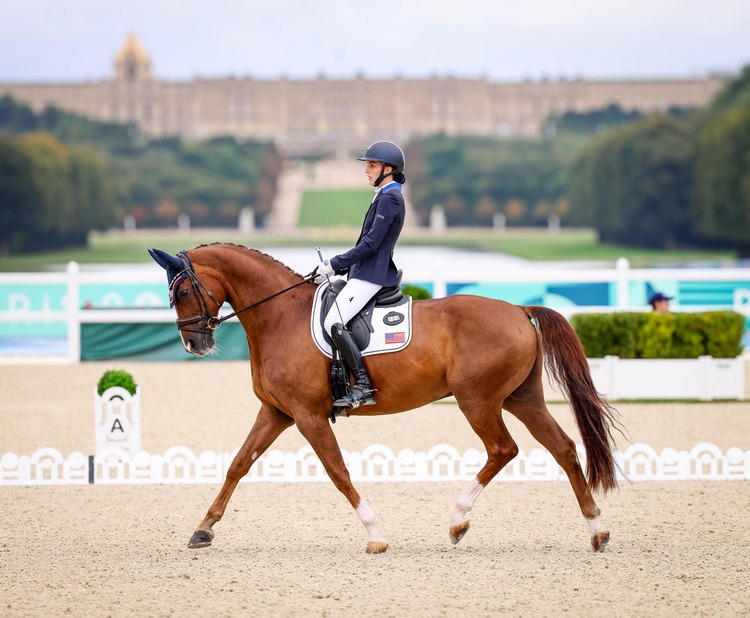
Fiona Howard and Diamond Dunes (US Equestrian Photo)
“We haven’t been a partnership for that long – only since March when we did our first competition,” Fiona said.
“I just trusted him and he gave me everything in there. I am so proud of him. He’s never let me down.”
Roxie Trunnell earned silver in Grade I with 78 percent on Fan Tastico H behind Rihards Snikus of Latvia on King of the Dance (79.167), a silver medalist at the last Paralympics in Tokyo.
“It was a really beautiful performance, we enjoyed watching it,” said Latvia’s chef d’equipe Darja Tikhomirova, speaking on behalf of Rihards, who is also the reigning Grade I world champion and an active DJ.
“After Tokyo, we came home and said, `Okay, next time, let’s get gold.’ ”
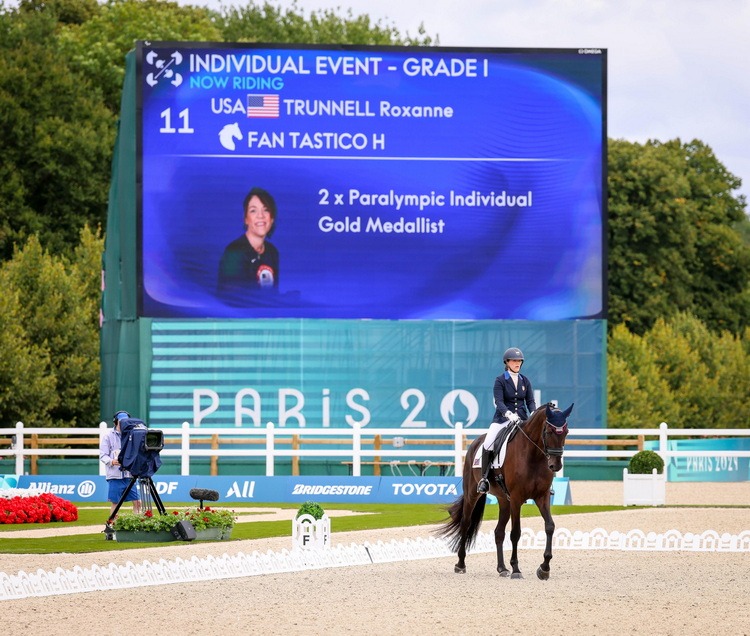
Roxie Trunnell and Fan Tastico H (US Equestrian photo)
Roxie, who was a double gold medalist in 2021 at the Paralympics in Tokyo, said. “We’ve all been working so hard. It’s nice to see it pay off.”
She paid tribute to the influence on U.S. fortunes of Michel Assouline, who spent 12 years as head coach of Great Britain’s para equestrian team before joining Team USA in 2017 as head of para equestrian coach development and high performance consultant.
“He is really good,” Trunnell said. “He got us all straightened up, training harder, with better horses. We have evolved our training and been working so hard. It’s nice to see it pay off.”
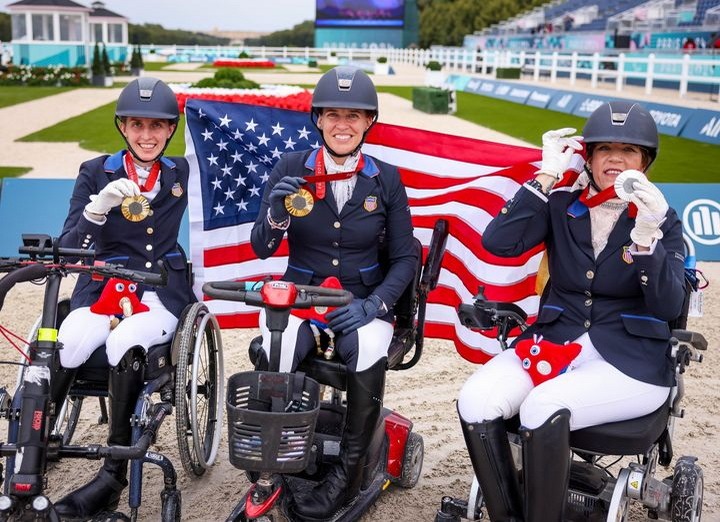
U.S. Para medalists: Fiona Howard, Becca Hart, Roxie Trunnell (US Equestrian Photo)
All three U.S. medalists qualified for the freestyle competition later in the Games, where the top eight in each category will compete.
Even before the Paralympics, the U.S. was the number one-rated team in the world. The country looks set to keep that ranking after day one in Paris.
click here for Grade III results
Click here for Grade II results
Click here for Grade I results
by Nancy Jaffer | Sep 5, 2024
The U.S. Paralympic equestrian squad was facing a big challenge in Friday’s team test against 14 other countries. Great Britain always seems like the team to beat, having won every team medal since 2006. But the Dutch are also a prime contender
But the U.S. came prepared. The squad was composed of the country’s three individual medal winners: two gold (Becca Hart and Fiona Howard) and one silver medalist (Roxie Trunnell). The U.S. is only the third nation (after Germany and Great Britain) to win two individual gold medals in one Games, according to EquiRatings. Of course, it must be said that Britain, a paralympics juggernaut that was double gold in 2008, won two more in 2012 and three in 2016.
This was the first time the U.S.won three medals in the individual classification. Even before the team competition, the country had matched its highest Para medal count, from 1996 in Atlanta and 2021 in Tokyo.
The only non-medalist so far is Kate Shoemaker, fifth in the Grade IV competition. However, she qualified for Saturday’s freestyle, as did Becca, Fiona and Roxanne.
A spook in the canter near the end of Kate’s test Wednesday with Vianne ended the USA’s medal run in the individual competition.
Shoemaker, ranked number one in the world in her grade, began working with the U.S.-bred Vianne this year. They made their international debut as a combination in Doha last February.
“The first day I knew that it was something so incredibly special and she just kept proving that show after show. It was a clear decision to bring her here,” said Kate.
Their Paris test was trending around 75 percent until the spook. She ended on 72.222 percent.
“That was the first spook she’s ever had with me, but horses are horses, and if we wanted to ride something predictable, we would ride motorcycles, but regardless of anything – I love her more than anything in the world,” Kate said about the 8-year-old Hanoverian mare.
‘”She went into that stadium like she’s done it a million times and it was incredible. She’s allowed to be a horse and she’s certainly forgiven because there’s going to be a lot more beautiful days in the future.”
Chef d’Equipe Michel Assouline emphasized, “Kate rode beautifully today. The two of them were incredibly accurate and in sync with one another – the picture was just beautiful.
“We have to remember horses are not machines, and sometimes things outside of our control happen in the arena. Kate handled the rest of the ride after Vianne’s spook perfectly and they still finished with a competitive score.”
It was a Dutch double for the top placings in the Grade IV class, as Demi Haerkens took gold in her Paralympic Games debut. The 2023 European Championships gold medalist won with Daula on 78.722 percent.
“It was such a lovely ride,” said Demi.
“She was so focused, with such lovely quality and softness. We didn’t make any mistakes. She was with me and dancing with a lot of quality. She was amazing. Now I want to go to the stable and give her big cuddles.”
Her compatriot, defending champion Sanne Voets, who won double individual gold and team silver on Demantur in Tokyo 2021, rode the same horse to silver on 76.528 percent.
The bronze went to Germany’s Anna-Lena Niehues on Quimbaya 6 with 75.222 percent.
There were no American competitors in the Grade V competition, won by Belgium’s Michèle George. It was her sixth Paralympic Games gold and seventh medal overall as she defended her Individual title on Best of 8. The double individual gold medalist at Tokyo 2021, was marked at 76.692 percent.
“I’m incredibly happy. She (Best of 8) was amazing. For me, it felt like a gold medal because I had nearly no mistakes and she was really dancing with me. I enjoyed every second of it. It means a lot,” the winner enthused.
Regine Mispelkamp of Germany on Highlander Delight’s, added a silver medal to her individual freestyle bronze from Tokyo, scoring 73.231 percent.
Sophie Wells of Great Britain rode LJT Egebjerggards Samoa to her ninth Paralympic medal by taking bronze with 72.257 percent adding to her four golds and four silvers from previous Games.
click here for Grade IV results
click here for Grade V results
by Nancy Jaffer | Sep 4, 2024
A spook in the canter near the end of Kate Shoemaker’s Grade IV test with Vianne Wednesday ended the USA’s medal run at the Paralympics in Paris, but her fifth-place finish guaranteed the new combination a start in the freestyle competition.
Shoemaker, ranked number one in the world in her grade, began working with the U.S.-bred Vianne this year. They made their international debut as a combination in Doha last February.
“The first day I knew that it was something so incredibly special and she just kept proving that show after show. It was a clear decision to bring her here,” said Kate.
Their test was trending around 75 percent until the spook. She ended on 72.222 percent.
“That was the first spook she’s ever had with me, but horses are horses, and if we wanted to ride something predictable, we would ride motorcycles, but regardless of anything – I love her more than anything in the world,” Kate said about the 8-year-old Hanoverian mare.
‘”She went into that stadium like she’s done it a million times and it was incredible. She’s allowed to be a horse and she’s certainly forgiven because there’s going to be a lot more beautiful days in the future.”
Chef d’Equipe Michel Assouline emphasized, “Kate rode beautifully today. The two of them were incredibly accurate and in sync with one another – the picture was just beautiful.
“We have to remember horses are not machines, and sometimes things outside of our control happen in the arena. Kate handled the rest of the ride after Vianne’s spook perfectly and they still finished with a competitive score.”
It was a Dutch double for the top placings in the class, as Demi Haerkens took gold in her Paralympic Games debut. The 2023 European Championships gold medalist won with Daula on 78.722 percent.
“It was such a lovely ride,” said Demi.
“She was so focused, with such lovely quality and softness. We didn’t make any mistakes. She was with me and dancing with a lot of quality. She was amazing. Now I want to go to the stable and give her big cuddles.”
Her compatriot, defending champion Sanne Voets, who won double individual gold and team silver on Demantur in Tokyo 2021, rode the same horse to silver on 76.528 percent.
The bronze went to Germany’s Anna-Lena Niehues on Quimbaya 6 with 75.222 percent.
The U.S. team for Friday’s competition will be named Thursday.
There were no American competitors in the Grade V competition, won by Belgium’s Michèle George. It was her sixth Paralympic Games gold and seventh medal overall as she defended her Individual title on Best of 8. The double individual gold medalist at Tokyo 2021, was marked at 76.692 percent.
“I’m incredibly happy. She (Best of 8) was amazing. For me, it felt like a gold medal because I had nearly no mistakes and she was really dancing with me. I enjoyed every second of it. It means a lot,” the winner enthused.
Regine Mispelkamp of Germany on Highlander Delight’s, added a silver medal to her individual freestyle bronze from Tokyo, scoring 73.231 percent.
Sophie Wells of Great Britain rode LJT Egebjerggards Samoa to her ninth Paralympic medal by taking bronze with 72.257 percent adding to her four golds and four silvers from previous Games.
click here for Grade IV results
click here for Grade V results
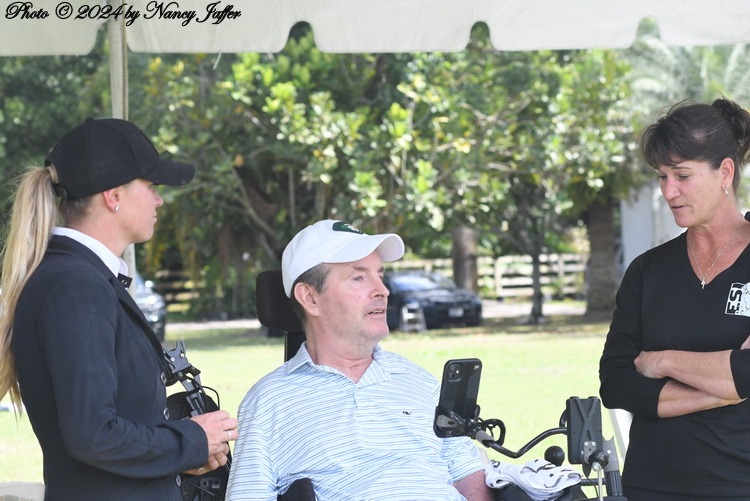
by Nancy Jaffer | Aug 22, 2024
Six years ago, the life of the Babington family changed forever.
Top international show jumper Kevin Babington suffered a disastrous fall with his horse in a grand prix, a crash that left him with a contusion of the spinal cord as a result of hyperextending his neck in the accident. The vertebrae hit the spinal cord, causing damage; it was a stretch and concussion injury from vertebra C3 to C5, which involves the diaphragm and mobility.
The man who had been the pillar of his family, wife Dianna and daughters Gwyneth and Marielle, suddenly found himself dependent on them and others. Not only was he unable to ride and earn a living the way he always had, he couldn’t walk, use his hands or do almost anything for himself. He’s also in chronic pain.

Kevin and Dianna Babington. (Photo © 2024 by Nancy Jaffer)
With the primary breadwinner sidelined and in need of costly care, the family faced a future burdened with constant worry. Finances were a huge concern, but Kevin’s friends offered whatever aid they could.
One of the constants in the circle of help has been the Babington Benefit Horse Show, organized every year since a few weeks after his 2019 accident. It is held at Duncraven in Titusville, a scenic section of Hopewell Township, New Jersey.
This year’s show is Sept. 7, about a month earlier than usual due to various changes in the competition calendar, but that likely will be a blessing with better weather than the usual October date often brings.
All the labor for the show is done by volunteers. The Stout family who owns Duncraven enables use of the property free of charge, a tradition started by the previous owner, Tim Fedor. Kevin once had his business at that venue.
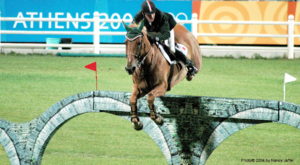
Kevin in the 2004 Olympics. (Photo © 2004 by Nancy Jaffer)
The judges, Creigh Duncan, Abbe Wolfe, Bri Quinn and Michelle Morasky donate their time, as does secretary Mary Norris. The show is approved by the N.J. Professional Horseman’s Association, so riders can earn points toward that group’s awards.
Special classes offered include the Handy Hunter Derby with fences ranging from 2 feet to 3 feet, so everyone can choose their preferred height. There’s also a bareback ride-a-buck, a nod to Kevin’s appreciation of riding bareback. Young competitors tuck a $5 bill under their knees ($10 or $20 in the case of adults) and the winner is the last one whose “buck” hasn’t fallen. The victor gets half the money that has hit the ground, but they can donate that amount if they choose.
Entry fees and proceeds from a raffle go to the Babington Family Trust. It helps pay for the many things Kevin and his family need to live that aren’t covered by the Kevin Babington Foundation, which also aids other equestrians with spinal injuries.
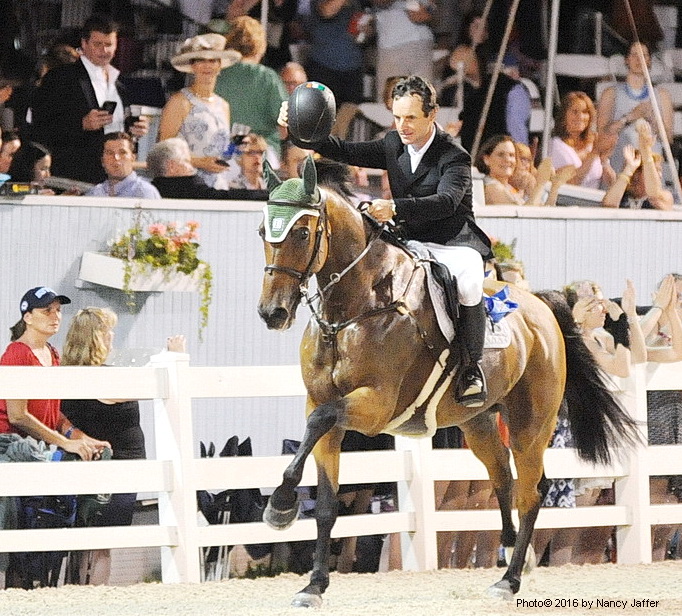
Kevin on his victory lap after winning the Devon Horse Show Grand Prix in 2016 on Mark Q. (Photo © 2016 by Nancy Jaffer)
The show has three co-managers: Nancy Wallis, Jennifer Cassidy and Julie Koveloski. Entries are through horseshowing.com at https://horseshowing.com
“As soon as we start putting out notices,” said Jennifer, “everyone gets excited about this every year. It’s a lot of support from the community.”
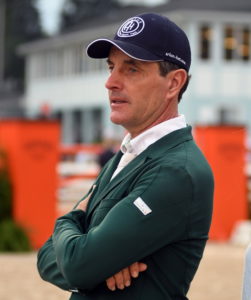
Kevin taking a view of the course at Devon during his riding days. (Photo © by Nancy Jaffer)
The organizers are looking for volunteers, including those who can work two days before the show for set-up and the day after for take-down, as well as for jump crew on the day of the show. Nancy is happy to hear from anyone who wants to volunteer at (908) 256-3386. Jennifer’s number is (215) 954-9062.
The show also needs raffle items, which in the past have included gift baskets, tack and gift certificates for everything from horse transportation to dinners. Julie can be reached by those offering such items at (609) 439-8983.
Kevin, who rode for Ireland and tied for fourth in the 2004 Olympics, teaches from his wheelchair on the porch of his Loxahatchee, Fla., farm, where the family also has stalls for rent. Dianna also teaches to help support the family.
Nancy said every time she calls Kevin, he tells her he’s fine and doesn’t talk about himself. He works at his physical therapy and has been involved in a number of clinical trials. Kevin has not given up hope that he will walk again on his own, and perhaps be able to ride someday.
“We keep waiting for something to break,” Dianna said about innovative therapies that could make a big difference for her husband.
“We’re hopeful something in his lifetime will be available, but there’s still nothing. I think someday something will be able to fix this, but it’s just not far enough along now.”
She and Kevin are grateful for those who help, and note the benefit show has a special place in the couple’s hearts. A former resident of New Jersey and Pennsylvania, Dianna said, “I love and miss the Northeast. It’s a community I wish I’d never had to leave. The people who are there are extremely special. I never feel like they have forgotten us.”
Other fundraisers have expanded from the Foundation to include special classes dedicated to Kevin at various shows, and even sponsorship of Kevin-related jumps.
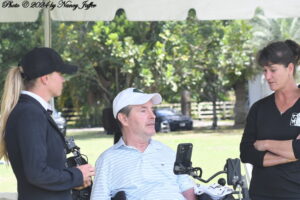
Friends haven’t forgotten Kevin Babington. (Photo © 2024 by Nancy Jaffer)
People who can’t make it to the show but want to donate may give to the Kevin Babington Trust, which goes directly to him for a variety of expenses that are related to his condition. Checks may be sent to Kevin at 13254 Casey Road, Loxahatchee, Fla. 33470.
Those looking for a tax deduction with their contribution can donate to the Kevin Babington Foundation. The 501(c)3 provides support not only to Kevin, but also to other show jumpers who have suffered spinal injuries. It helps pay for aides, which enables Dianna and Kevin’s girls to keep working.
Its mission for those seeking help includes outfitting vehicles for transportation and remodeling to make homes suitable for the disabled, but does not contribute toward daily expenses.














